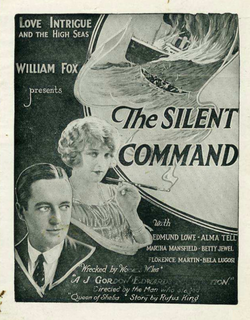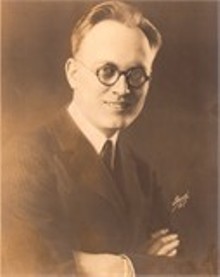Related Research Articles

Money Mad is a 1908 American short crime film directed by D. W. Griffith. It is based on the short story "Just Meat" by Jack London.

The Silent Command is a 1923 American silent drama film directed by J. Gordon Edwards featuring Bela Lugosi as a foreign saboteur in his American film debut. The film, written by Anthony Paul Kelly and Rufus King, also stars Edmund Lowe, Alma Tell, and Martha Mansfield. The film depicts the story of Benedict Hisston (Lugosi), who is part of a plot to destroy the Panama Canal. Initially unable to obtain necessarily intelligence from Richard Decatur (Lowe), a captain in the United States Navy, he enlists the aid of femme fatale Peg Williams (Mansfield). Decatur pretends to be seduced into the conspiracy, costing him his career and estranging him from his wife (Tell), but he ultimately betrays the saboteurs in Panama and stops their plan. He returns home to the Navy and his wife, and to popular acclaim for his heroics.

In the Palace of the King is a 1923 American silent historical romantic drama film based on the novel of the same name by F. Marion Crawford. Directed by Emmett J. Flynn, the film stars Blanche Sweet, Pauline Starke, and Edmund Lowe.

Harlan Thompson was an American theatre director, screenwriter, lyricist, film director, and film and television producer. He wrote the Broadway hit Little Jessie James (1923–24), and several other Broadway musicals. He moved to Hollywood, where he was in turn a writer, director and producer.

Marie Wainwright was an American stage and sometimes screen actress. She achieved the bulk of her fame on the Victorian stage. Her parents were Commodore J.M. Wainwright and Maria Wainwright. She was educated in France and made her first stage appearance in 1877 in Romeo and Juliet. She later was leading lady for Edwin Booth, Lawrence Barrett and Tommaso Salvini. She acted in the classics and high drama until the turn of the century, then began appearing in more contemporary plays. Later in life she made an attempt at silent film acting, making just three films. She died in Scranton Pennsylvania in 1923.

39 East is a 1920 American silent comedy film produced by the Realart Picture Company, and starring Constance Binney reprising her role from the Broadway play. The film was directed by John S. Robertson.

The Still Alarm is a melodramatic play by Joseph Arthur that debuted in New York in 1887 and enjoyed great success, and was adapted to silent films in 1911, 1918, and 1926. Though never a favorite of critics, it achieved widespread popularity. It is best known for its climactic scene where fire wagons are pulled by horses to a blazing fire.

In Old Kentucky is a 1927 American silent drama film produced and distributed by Metro-Goldwyn-Mayer and directed by John M. Stahl. The film was based on the popular 1893 play of the same name by Charles T. Dazey and stars Helene Costello and James Murray. In Old Kentucky also features an early performance by Lincoln Perry, who later became known as Stepin Fetchit. The performance proved to be a breakthrough for Perry who signed a five-year contract with Fox Film Corporation shortly after the film's release.

Common Clay is a 1915 play by the American writer Cleves Kinkead. A social drama, it shows the relationship between a servant and a member of the wealthy family which she serves. When she becomes pregnant she finds herself ostracized by them. The play was controversial on its release, but enjoyed a lengthy run on Broadway. It was the outstanding success of Kinkead's career, and he struggled to repeat it with his later works such as Your Woman and Mine (1922).
Quinneys is a comedy-drama play by the British writer Horace Annesley Vachell, which was first staged in 1914. It was a major hit on its release and went on to become one of the author's most successful plays. However, despite its popularity in London the play met with a lukewarm reception when it opened in New York City in 1915. It focuses on Joseph Quinney the endearing but stubborn head of a family firm of antiques dealers whose firm views cause problems for his relatives and friends.

The Little Cafe is a French comedy play written by Tristan Bernard which was first performed in 1911. An English-language musical version The Little Cafe was successfully staged in the United States in 1913.
The Case of Lady Camber is a play by the British writer Horace Annesley Vachell, which was first performed in 1915. The play was a success in the West End, enjoying a lengthy run at the Savoy Theatre. It was not as well received in New York when it opened at the Lyceum Theatre in 1917.

It Is the Law is a 1924 American silent mystery film directed by J. Gordon Edwards and starring Arthur Hohl, Herbert Heyes, and Mona Palma. It is a film adaptation of the 1922 Broadway play of the same name by Elmer Rice, itself based on a novel by Hayden Talbot. The film depicts the story of Ruth Allen (Palma), who marries Justin Victor (Heyes) over competing suitor Albert Woodruff (Hohl). Seeking revenge for this slight, Woodruff fakes his own death by killing a drifter who resembles him, and frames Victor for the murder. Woodruff attempts to renew his courtship of Allen by using an assumed identity, but she sees through his disguise. Once Victor is freed from prison, he kills Woodruff and goes free because a conviction would constitute double jeopardy.

Roi Cooper Megrue was an American playwright, producer, and director active on Broadway from 1914 to 1921.
Is Zat So? is a lost 1927 silent film directed by Alfred E. Green and starring George O'Brien, Edmund Lowe and Douglas Fairbanks Jr. It was produced and distributed by the Fox Film Corporation.
Old Acquaintance is a 1940 play by the British writer John Van Druten.

John Goldsworthy (1884–1958) was a British-born stage and film actor. After emigrating to the United States he was active on Broadway appearing in a variety of plays, as well as several musicals. During the silent era he appeared in supporting roles in American films. Later in the 1940s he returned to the cinema, now playing mainly small, uncredited parts. His final film was MGM's The Prisoner of Zenda (1952).

The Voice from the Minaret is a play by the British writer Robert Hichens. It premiered at the Globe Theatre in London's West End in 1919, with a cast including Marie Lohr, Arthur Wontner, Henry Vibart, Norman McKinnel, George Hayes and Vane Featherston. In 1922 it was staged on Broadway at the Hudson Theatre with Lohr and Herbert Marshall heading the cast, and Edmund Gwenn receiving the best reviews.
Louise Prussing (1895–1994) was an American stage and film actress. Known primarily for her roles on Broadway, she also appeared in a number of silent films including the 1929 British film The Woman in White.
Nothing But the Truth is a 1914 comedy novel by the American writer Frederic S. Isham. It was adapted into a hit 1916 Broadway play of the same title.
References
- ↑ Bordman p.293